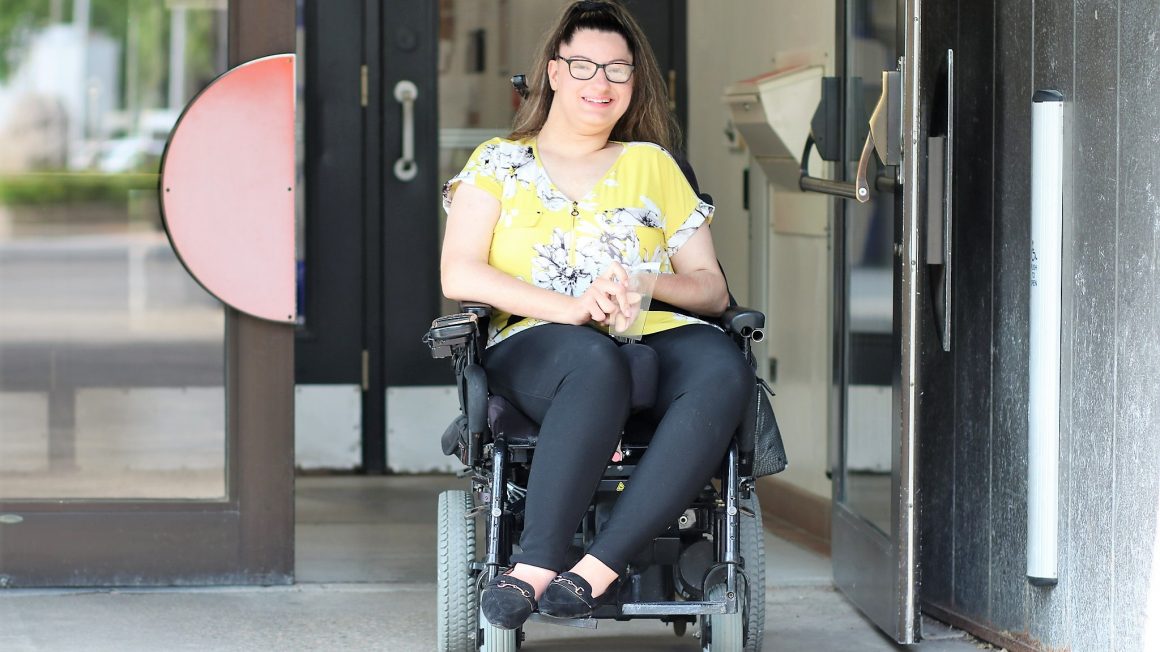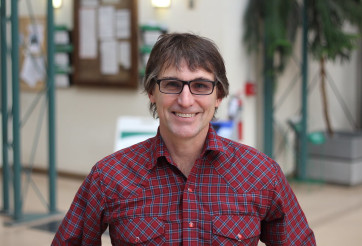A graduate of The University of Winnipeg has received a national award for her efforts to make campus more accessible to users of wheelchairs and other mobility aids.
Sarah Anderson received the Change-Maker Award from Neurological Health Charities Canada (NHCC) on May 25. The award recognizes individuals who have improved the quality of life for Canadians living with brain conditions.
NHCC is a coalition of organizations that represent millions of Canadians living with brain diseases, disorders, and injuries that affect mobility, dexterity, memory, or the ability to think.
In my life, I’ve tried to use and focus on the gifts that it gives me, rather than the challenges it presents. I try to focus on how my life is different and what I bring to the table because of that different worldview connected to my disability.
Sarah Anderson
Anderson, 23, spearheaded the More Than a Door Campaign at UWinnipeg in 2020 while serving as Accessibility Director on the University of Winnipeg Students’ Association (UWSA) Board of Directors.
“I realized early on in my journey at UWinnipeg that most of the doors, especially classroom doors and some external doors as well, were not accessible to me as a wheelchair user,” Anderson said.
Her campaign led UWinnipeg to partner with the UWSA to purchase 78 automatic door openers for campus buildings. Forty-four and counting have been installed to date.
“I hope it continues until every community member and every student has access to every door that they require, regardless of their ability level,” said Anderson, who lives with generalized dystonia, a non-fatal but progressive movement disorder that causes excessive, involuntary muscle contractions.
Anderson chose UWinnipeg because of its small, navigable campus and leading education program. She enrolled “fresh out of high school” in 2018 and majored in English and psychology.
Arriving on campus, it wasn’t long before she was sharing tips on accessibility advocacy as a guest speaker.
“Self-advocacy is hard,” she said. “It requires vulnerability. It requires someone to value themselves enough to say, ‘Hey, I need help with this,’ or ‘Hey, I need this accommodation in order to be successful.’”
In June, when Anderson graduated with a BA and BEd, it was the culmination of a lifelong dream.
“I’ve wanted to be a teacher since I was in middle school,” she said.
The Change-Maker Award isn’t the first distinction bestowed on Anderson. She was a Teen Ambassador for the Rick Hansen Foundation in 2016 and, the following year, became the first Teen Ambassador for Dystonia Medical Research Foundation (DMRF) Canada.
“Sarah is an incredible asset to DMRF Canada and to the dystonia community,” Archana Castelino, National Director of DMRF Canada and a member of NHCC, said in a release. “Through her awareness efforts, she has championed the needs of her community and has helped further the public profile of dystonia. Her dedicated advocacy work has resulted in a more equitable environment for future generations at The University of Winnipeg.”
Receiving the award was an emotional experience for Anderson, whose thoughts turned to the community that supported her.
“I’ve been long moved by the disability community, and I thought about all the ways that they’ve inspired my journey,” she said. “So many of them have been able to take difficult diagnoses and turn those into their own type of social advocacy.”
It’s inspired Anderson to view her own disability in a constructive light.
“In my life, I’ve tried to use and focus on the gifts that it gives me, rather than the challenges it presents. I try to focus on how my life is different and what I bring to the table because of that different worldview connected to my disability.”
Anderson is currently a term substitute teacher at Maples Collegiate, where she teaches Grade 10 English and Grade 9 film studies. Her presence at the front of the classroom also teaches something.
“There aren’t a lot of teachers with disabilities in the field,” she said. “Growing up, I never had a teacher that looked like me or experienced the same challenges as me.”
“It’s transforming how students and young people see teachers, and that’s an amazing thing that dystonia has given me.”



